#eve kosofsky sedgwick
Text
“Even at an individual level, there are remarkably few of even the most openly gay people who are not deliberately in the closet with someone personally or economically or institutionally important to them. Furthermore, the deadly elasticity of heterosexist presumption means that, like Wendy in Peter Pan, people find new walls springing up around them even as they drowse: every encounter with a new classful of students, to say nothing of a new boss, social worker, loan officer, landlord, doctor, erects new closets whose fraught and characteristic laws of optics and physics exact from at least gay people new surveys, new calculations, new draughts and requisitions of secrecy or disclosure. Even an out gay person deals daily with interlocutors about whom she doesn't know whether they know or not; it is equally difficult to guess for any given interlocutor whether, if they did know, the knowledge would seem very important. Nor-at the most basic level-is it unaccountable that someone who wanted a job, custody or visiting rights, insurance, protection from violence, from "therapy," from distorting stereotype, from insulting scrutiny, from simple insult, from forcible interpretation of their bodily product, could deliberately choose to remain in or to reenter the closet in some or all segments of their life. The gay closet is not a feature only of the lives of gay people.But for many gay people it is still the fundamental feature of social life; and there can be few gay people, however courageous and forthright by habit, however fortunate in the support of their immediate communities, in whose lives the closet is not still a shaping presence.“
Eve Kosofsky Sedgwick, Epistemology of the Closet
6K notes
·
View notes
Text


What I would be when I grew up, I never wondered that (maybe I knew that);
I wondered other things: if I'd be sane. Loved.
// Fat Art, Thin Art, 'Performative (San Francisco) by Eve Kosofsky Sedgwick
#Eve Kosofsky Sedgwick#poets on tumblr#dark academia#spilled poetry#aesthetic#spilled ink#words#spilled thoughts#19th century
23 notes
·
View notes
Text
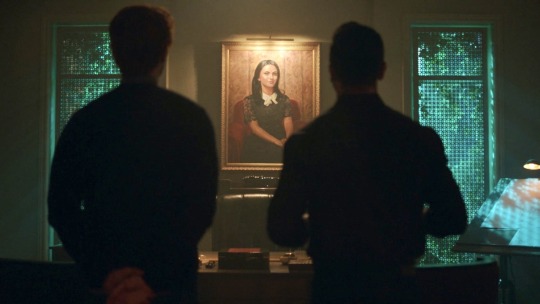

riverdale (2017–2023) s02 e03 “the watcher in the woods” // “gender asymmetry & erotic triangles” - eve kosofsky sedgwick, between men: english literature & male homosocial desire
#my comps#parallels#comparatives#web weaving#riverdale#eve kosofsky sedgwick#archie#hiram#archie andrews#hiram lodge#veronica lodge
49 notes
·
View notes
Text
Just started watching Alert: Missing People. I had to wait till I’d seen all of H5O. I zoomed thru the first 4 eps.
Scott Caan is so very good! No surprise, but yeah. And, not standing next to a 6’1” Adonis (who, yeah, I miss!) must be a bit of a relief (if only for the director and wardrobe people).
There’s something very *gentle* about Scott, despite the explosive temper and hand gestures. Once again, he plays the father and friendly ex-husband well. His voice is different w/out the Jersey accent. Oh, and he’s still hot af.
Really enjoying the rest of the cast, too. Petey Gibson’s cute.
I’m hoping for some buddy action between Jay and Mike, btw. Maybe some slash? The setup is already seriously triangulation-based.

9 notes
·
View notes
Text
'There was something especially devastating about the wave of anti–“PC” journalism in the absolutely open contempt it displayed, and propagated, for every tool that has been so painstakingly assembled in the resistance against these devaluations. Through raucously orchestrated, electronically amplified campaigns of mock-incredulous scorn, intellectual and artistic as well as political possibilities, skills, ambitions, and knowledges have been laid waste with a relishing wantonness. No great difficulty in recognizing those aspects of the anti–“PC” craze that are functioning as covers for a rightist ideological putsch; but it has surprised me that so few people seem to view the recent developments as, among other things, part
of an overarching history of anti-intellectualism: anti-intellectualism left as well as right. No twentieth-century political movement, after all, can afford not to play the card of populism, whether or not the popular welfare is what it has mainly at heart (indeed, perhaps especially where it is least so). And anti-intellectual pogroms, like anti-Semitic or queer-bashing ones, are quick, efficient, distracting, and almost universally understood signifiers for a populist solidarity that may boil down to nothing by the time it reaches the soup pot. It takes care and intellectual scrupulosity to forge an egalitarian politics not founded on such telegraphic slanders. Rightists today like to invoke the threatening specter of a propaganda ridden socialist realism, but both they and the anti-intellectuals of the left might meditate on why the Nazis’ campaign against “degenerate art” (Jewish, gay, modernist) was couched, as their own arguments are, in terms of assuring the instant, unmediated, and universal accessibility of all the sign systems of art (Goebbels even banning all art criticism in 1936, on the grounds that art is self-explanatory). It’s hard to tell which assumption is more insultingly wrong: that the People (always considered, of course, as a monolithic unit) have no need and no faculty for engaging with work that is untransparent; or that the work most genuinely expressive of the People would be so univocal and so limpidly vacant as quite to obviate the labors and pleasures of interpretation. Anti-intellectuals today, at any rate, are happy to dispense with the interpretive process and depend instead on appeals to the supposedly self-evident: legislating against “patently offensive” art (no second looks allowed); citing titles as if they were texts; appealing to potted summaries and garbled trots as if they were variorum editions in the original Aramaic. The most self evident things, as always, are taken—as if unanswerably—to be the shaming risibility of any form of oblique or obscure expression; and the flat inadmissability of openly queer articulation.
These histories of anti-intellectualism cut across the “political correctness” debate in complicated ways. The term “politically correct” originated, after all, in the mockery by which experimentally and theoretically minded feminists, queers, and leftists (of every color, class, and sexuality) fought back against the stultifications of feminist and left anti-intellectualism. The hectoring, would-be populist derision that difficult, ambitious, or sexually charged writing today encounters from the right is not always very different from the reception it has already met with from the left. It seems as if many academic feminists and leftists must be grinding their teeth at the way the right has willy-nilly conjoined their discursive fate with that of theorists and “deconstructionists”—just as, to be fair, many theorists who have betrayed no previous interest in the politics of class, race, gender, or sexuality may be more than bemused at turning up under the headings of “Marxism” or “multiculturalism.” The right’s success in grouping so many, so contestative, movements under the rubric “politically correct” is a coup of cynical slovenliness unmatched since the artistic and academic purges of Germany and Russia in the thirties.'
(Eve Kosofsky Sedgwick, "Queer and Now," in Tendencies, 16-17 - published 1994)
#long post but holy shit#weird how this is 30 years old and if you replace 'political correctness' with 'wokeness' this could have been written yesterday#eve kosofsky sedgwick
14 notes
·
View notes
Text
“The moralistic hygiene by which any reader of today is unchallengeably entitled to condescend to the thought of any moment in the past (maybe especially the recent past) is globally available to anyone who masters the application of two or three discrediting questions. How provisional, by contrast, how difficult to reconstruct and how exorbitantly specialized of use, are the tools that in any given case would allow one to ask: What was it possible to think or do at a certain moment of the past that it no longer is? And how are those possibilities to be found, unfolded, allowed to move and draw air and seek new voices and uses, in the very different disciplinary ecology of even a few decades distance?”
Eve Kosofsky Sedgwick and Adam Frank, “Shame in the Cybernetic Field”
39 notes
·
View notes
Text

The Argonauts, Maggie Nelson
#yun txt#my scans#i loved this memoir so much. books that make you weep openly#book quote#maggie nelson#eve kosofsky sedgwick#id in alt text
13 notes
·
View notes
Photo
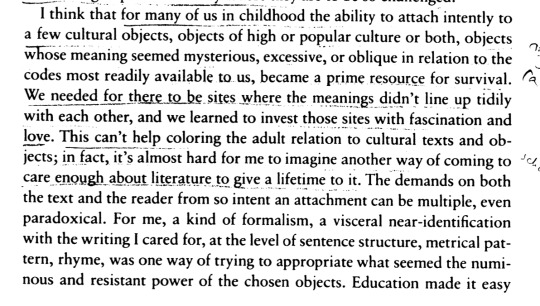

- From "Queer and Now" by Eve Kosofsky Sedgwick, from page 3 of her essay collection Tendencies
[IMAGE ID: Screenshots of a text saying:
I think that for many of us in childhood the ability to attach intently to a few cultural objects, objects of high or popular culture or both, objects whose meaning seemed mysterious, excessive, or oblique in relation to the codes most readily available to use, became a prime resource for survival.
We need for there to be sites where the meanings didn’t line up tidily with each other, and we learned to invest those sites with fascination and love. This can’t help coloring the adult relation to cultural texts and objects; in fact, it’s almost hard for me to imagine another way of coming to care enough about literature to give a lifetime to it.
The demands on both text and the reader from so intent an attachment can be multiple, even paradoxical. For me, a kind of formalism, a visceral near-identification with the writing I cared for, at level of sentence structure, metrical pattern, rhyme, was one of trying to appropriate what seemed the numinous and resistant power of the chosen objects.
Education made it easy to accumulate tools for this particular formalist project, because the texts that magnetized me happened to be novels and poems; it’s impressed me deeply the way others of my generation and since seem to have invented for themselves, in the spontaneity of great need, the tools for a formalist apprehension of other less prestigious, more ubiquitous kinds of text: genre movies, advertising, comic strips. END ID]
____
Something something queerness in fandom, something something neurodivergency in fandom, something something BIPOC consumers in fandom and disability in fandom and everything from everyone in fandom, something something the way a piece of media just speaks to you when you need it most--like the way an academic text written by a stranger years before your birth feels like it was written with you in mind, or a show about cartoon turtles, or anything else in the world.
Something something and it just hits.
#queer#neurodiversity#actually neurodivergent#actually autistic#queer studies#eve kosofsky sedgwick#gay author#lesbian author#lesbian pride#lesbian#LGBTQIA+#LGBTQIA+ pride#fandom#tmnt#fandom culture#fandom fuckery#fandom friends#actually queer#gay#queer history#image id
15 notes
·
View notes
Text
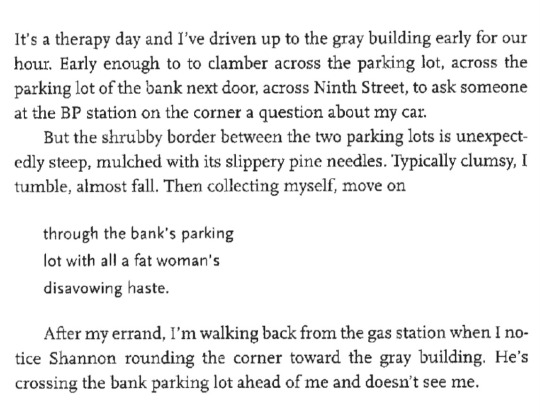


From Eve Kosofsky Sedgwick’s therapy memoir Dialogue On Love (the text in caps is from the therapist’s notes). This is hands down one of the best book endings I’ve ever read, how it vibrates with love. It’s almost like it was written to rebalance the universe after Tolstoy’s egregious ending to War and Peace, which I finished reading last week. I still can’t believe we followed Natasha across 1300 pages only for Tolstoy to declare she “let herself go” when she got married, followed by some 60 pages of mansplaining about his half-baked ideas on the philosophy of history. Some writers don’t know how to stick a landing. Eve knew that profound revelation is not reached through grand statements, but by attention to the minutiae of life, its uncanny resonances, when one experiences the condensation of sweetness while observing the therapist’s small gesture of repair as he smooths the mulch, unaware that it was she who clumsily displaced it. We fall in love in such moments. Truer words have never been written.
13 notes
·
View notes
Text
“MacKinnon concludes, ‘what defines a woman as such is what turns men on.’ But what defines defines?”
Eve Kosofsky Sedgwick, Between Men: English Literature and Male Homosocial Desire
2 notes
·
View notes
Text
does anyone happen to have a copy of The Epistemology of the Closet by Eve Kosofsky Sedgwick that they could direct me to?
#gender studies#queer studies#Eve Kosofsky Sedgwick#the epistemology of the closet#my library does not have it#queer theory#gender theory
0 notes
Text

𝑊ℎ𝑎𝑡 𝐼 𝑤𝑜𝑢𝑙𝑑 𝑏𝑒 𝑤ℎ𝑒𝑛 𝐼 𝑔𝑟𝑒𝑤 𝑢𝑝, 𝐼 𝑛𝑒𝑣𝑒𝑟 𝑤𝑜𝑛𝑑𝑒𝑟𝑒𝑑 𝑡ℎ𝑎𝑡 (𝑚𝑎𝑦𝑏𝑒 𝐼 𝑘𝑛𝑒𝑤 𝑡ℎ𝑎𝑡); 𝐼 𝑤𝑜𝑛𝑑𝑒𝑟𝑒𝑑 𝑜𝑡ℎ𝑒𝑟 𝑡ℎ𝑖𝑛𝑔𝑠: 𝑖𝑓 𝐼'𝑑 𝑏𝑒 𝑠𝑎𝑛𝑒. 𝐿𝑜𝑣𝑒𝑑.
Eve Kosofsky Sedgwick, Fat Art, Thin Art, 'Performative (San Francisco)
25 notes
·
View notes
Text
「Besideは興味深い前置詞でもある。なぜなら、そこには二元論的なものは何もないからだ。無数ではないが、多くの要素が隣り合っているかもしれないからだからだ。 Besideは、二元論的思考を強制するいくつかの線形的な論理学の、ゆったりと広がる不可知論を可能にさせる。例えば、無矛盾律、排中律、原因と結果���主体と客体など。 しかし、その関心は、兄弟姉妹とベッドを共有したことのある子どもなら誰でも知っているように、密接で平等主義的な幻想や、平和的な関係に依存しない。 Besideには、欲望、同一化、表象、反発、並列化、識別化、対抗、もたれかけ、ねじれ、模倣、撤退、引き寄せ、攻撃、包み込みなど、その他の関係が幅広く含まれているのだ」(Eve Kosofsky Sedgwick, 𝙏𝙤𝙘𝙝𝙞𝙣𝙜 𝙁𝙚𝙚𝙡𝙞𝙣𝙜 8)。

0 notes
Photo
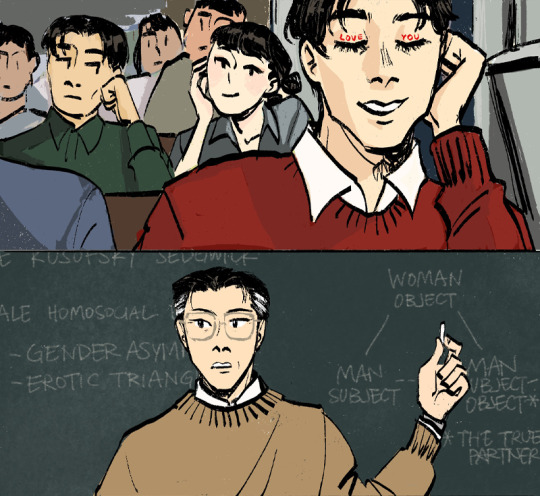
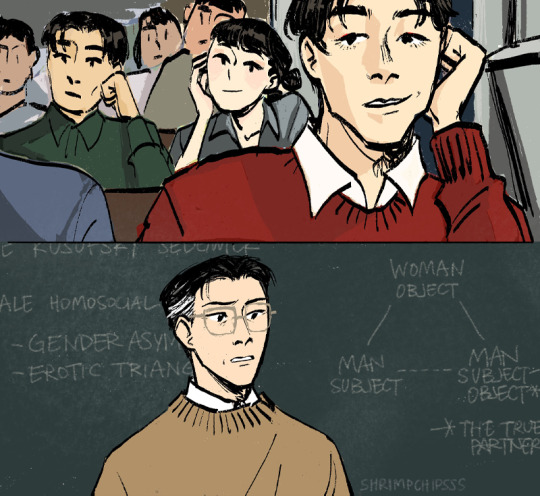
professor shen qingqiu, the most confusing man in academia
(redraw of that indiana jones scene)
#i just think it would be funny if he taught a queer studies class#he can monologue for hours on male homosocial desire but he is completely unknown to himself#sv fans you'd love between men by eve kosofsky sedgwick#sqq is full of homosocial triangles. between him binghe and every pidw wife he ever encounters#he is the first true instance of shipping characters as triangulation#we should give sqq even more frameworks with which to intellectualize and never have to feel his feelings#love him#shen qingqiu#luo binghe#sqq#lbh#svsss#scum villain#bingqiu#REUPLOADING W GLASSES OOPS#sv academia au
921 notes
·
View notes
Quote
Some of the infants, children, and adults in whom shame remains the most available mediator of identity are the ones called (a related word) shy. ('Remember the fifties?' Lily Tomlin used to ask. 'No one was gay in the fifties; they were just shy.') Queer, I'd suggest, might usefully be thought of as referring in the first place to this group or an overlapping group of infants and children, those whose sense of identity is for some reason tuned most durably to the note of shame... I'd venture that queerness in this sense has, at this historical moment, some definitionally very significant overlap, though a vibrantly elastic and temporally convoluted one, with the complex of attributes today condensed as adult or adolescent 'gayness.' Everyone knows that there are some lesbians and gay men who could never count as queer and other people who vibrate to the chord of queer without having much same-sex eroticism, or without routing their same-sex eroticism through the identity labels lesbian or gay. Yet many of the performative identity vernaculars that seem most recognizably 'flushed' (to use [Henry] James's word) with shame consciousness and shame consciousness and shame creativity do cluster intimately around lesbian and gay worldly spaces.
...
It has been all too easy for the psychologists and the few psychoanalysts working on shame to write it back into the moralisms of the repressive hypothesis: 'healthy' or 'unhealthy,' shame can be seen as good because it preserves privacy and decency, bad because it colludes with self-repression or social repression. Clearly, neither of these valuations is what I'm getting at. I want to say that at least for certain ('queer') people, shame is simply the first, and remains a permanent, structuring fact of identity: one that...has its own, powerfully productive and powerfully social metamorphic possibilities.
Eve Kosofsky Sedgwick, “Shame, Theatricality, and Queer Performativity: Henry James’s The Art of the Novel” from Touching Feeling
10 notes
·
View notes
Text
That post-all-nighter breakfast that tastes like. Actually my brain is so fried that I've tried to write this post like 10 times and I can't figure out how to formulate what I'm feeling
#for some reason my brain kept supplying ''tastes like eve kosofsky sedgwick's epistemology of the closet''. which isn't funny.#and isn't even marginally related to what I've been doing all night
21 notes
·
View notes